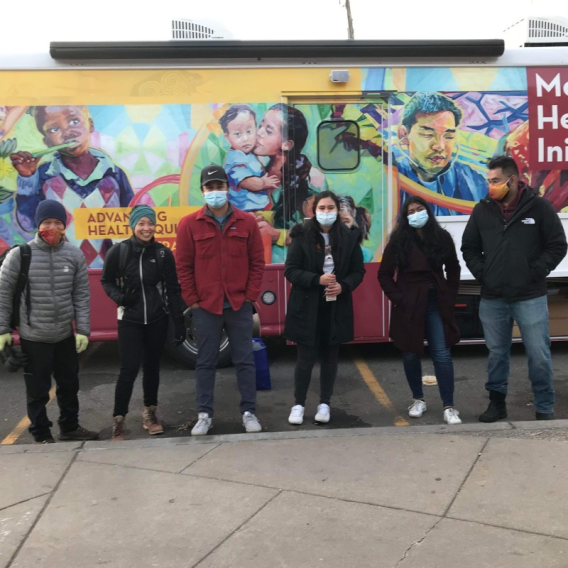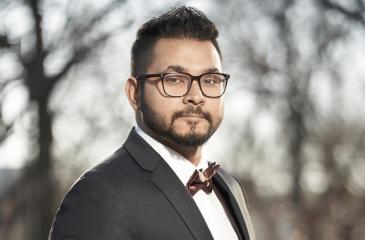Koushik Paul, an alumnus of CTSI’s Pathways to Research Program (PReP) is complementing his education at the University of Minnesota Medical School with hands-on community engagement work.
Paul and collaborators facilitate health fairs and roundtable discussions in partnership with the Little Earth community, an indigenous preference project-based Section 8 rental assistance community in Minneapolis’ Phillips neighborhood.
From campus to community
As part of these events, people affiliated with the University go out to Little Earth to connect with its community members.
“One of the key reasons it is important for clinicians, residents and medical students to participate is for us to learn about and experience the community’s strengths,” says Paul. “Despite going through all the health inequities you can think of, there are cultural strengths that keep the community together. Once we engage those strengths in conversations and make them part of our interactions with patients, we can better address those inequities.”
Confronting addiction
Addiction and treatment was the focus of last summer’s roundtables held by Little Earth, Paul, and his mentor, Cuong Pham, MD, an assistant professor in the Department of Medicine.
University students, faculty, and clinicians heard Little Earth’s perspectives about addiction care as well as trained community members on how to prevent and respond to overdoses.
“I truly think it was a hit,” said RoseMarie Roberts, a Little Earth community organizer and cultural services liaison. “I love that the people in the community got trained on what to do during an overdose from actual providers. It is helping a lot of people out.”

Community-centered
The community response proved so strong that discussions have expanded into health fairs at Little Earth to address other health issues important to residents.
Pham, who has worked to build bridges between the University and the Little Earth community for years, says the community-centric approach has made a difference:
“Healthcare has been focused on having patients come to established clinics to receive the resources and care they need, which ignores the barriers they often face. So when we can go to communities themselves, it makes it so much better for them.”
CTSI beginnings
For Paul, CTSI’s PReP program — which provides an opportunity for students from populations underrepresented in research to begin or advance their research career — was an important early step for what he’s doing today.
"As a first-generation college student and recent immigrant, the PReP program allowed me to have access to physician mentors such as Dr. Elizabeth Rogers and Dr. Pham and other role models who were actively involved in addressing health inequities within our local communities,” says Paul. “Health inequities deeply impacted my family so finding mentors conducting health equity research ignited an indomitable spirit within me to pursue medical school so I can be like my mentors someday and that's exactly what I am doing.”
From connections to publications
So far, relationships and mentorship opportunities through the program have led to five publications for Paul, and this is strictly out of the projects he started working on during the PReP program.
His current publication tally is 14 — an impressive feat for a medical student. Paul says the PReP program taught him how to take something from an idea to an actual manuscript, a skill on its own.
Skill-building
Paul also credits the program with helping him develop essential skills for conducting high-impact community-engaged research:
“The PReP experience equipped me with the skillset to become a community-engaged researcher. It taught me the power of relationship building and taught me to work with the community (versus on the community) to develop research questions and data that address the root cause of health inequities within the community. It also taught me how to utilize partnerships between faculty and community elders and leaders to develop and implement programming that improves health outcomes for underserved communities."
